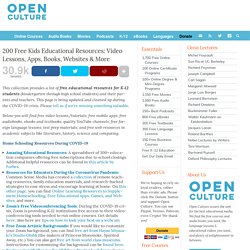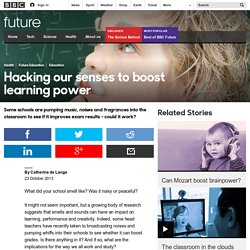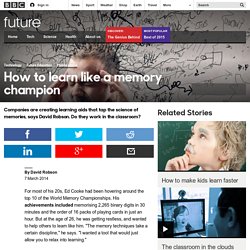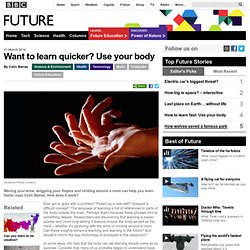

Conscious vs. subconscious thinking. Instructables - Make, How To, and DIY. Internet Archive: Digital Library of Free Books, Movies, Music & Wayback Machine. 200 Free Kids Educational Resources: Lessons, Apps, Books, Websites... This collection provides a list of free educational resources for K-12 students (kindergarten through high school students) and their parents and teachers.

This page is being updated and cleaned up during the COVID-19 crisis. Please tell us if we’re missing something valuable. Below you will find free video lessons/tutorials; free mobile apps; free audiobooks, ebooks and textbooks; quality YouTube channels; free foreign language lessons; test prep materials; and free web resources in academic subjects like literature, history, science and computing. Home Schooling Resources During COVID-19 Amazing Educational Resources: A spreadsheet of 300+ education companies offering free subscriptions due to school closings. Free Audio Books, eBooks and Textbooks Free Audio Books: Our collection of 450 free audio books includes many children’s classics. Foreign Languages Open Culture Foreign Language Collection: This list created by Open Culture offers free lessons in 40 different languages.
Future - Earworms: Why catchy tunes get trapped in our heads. Our resident psychologist Tom Stafford reveals why our brains find it hard to get rid of annoying, catchy songs, but he offers a possible solution.

"Earworms", some people call them. Songs that get stuck in your head and go round and round, sometimes for days, sometimes for months. For no apparent reason you cannot help yourself from humming or singing a tune by Lady Gaga or Coldplay, or horror upon horrors, the latest American Idol reject. Future - Does listening to Mozart really boost your brainpower? It is said that classical music could make children more intelligent, but when you look at the scientific evidence, the picture is more mixed.

You have probably heard of the Mozart effect. It’s the idea that if children or even babies listen to music composed by Mozart they will become more intelligent. A quick internet search reveals plenty of products to assist you in the task. Whatever your age there are CDs and books to help you to harness the power of Mozart’s music, but when it comes to scientific evidence that it can make you more clever, the picture is more mixed. The phrase “the Mozart effect” was coined in 1991, but it is a study described two years later in the journal Nature that sparked real media and public interest about the idea that listening to classical music somehow improves the brain. Future - Hacking our senses to boost learning power.
What did your school smell like?

Was it noisy or peaceful? It might not seem important, but a growing body of research suggests that smells and sounds can have an impact on learning, performance and creativity. Indeed, some head teachers have recently taken to broadcasting noises and pumping whiffs into their schools to see whether it can boost grades. Is there anything in it? And if so, what are the implications for the way we all work and study? There is certainly some well-established research to suggest that some noises can have a detrimental effect on learning. But general noise seems to have an effect too. Shield says the sound of “babble” – the chatter of other children, is particularly distracting in the classroom. Whether background sounds are beneficial or not seems to depend on what kind of noise it is – and the volume. Many teachers all over the world already play music to students in class.
Future - How to learn like a memory champion. Companies are creating learning aids that tap the science of memories, says David Robson.

Do they work in the classroom? For most of his 20s, Ed Cooke had been hovering around the top 10 of the World Memory Championships. His achievements included memorising 2,265 binary digits in 30 minutes and the order of 16 packs of playing cards in just an hour. But at the age of 26, he was getting restless, and wanted to help others to learn like him. "The memory techniques take a certain discipline," he says. The resulting brainchild was Memrise. “It's very powerful – it does all the spade work of learning,” says Dominic Traynor, who teaches Spanish at the St Cuthbert with St Matthias Primary School in London, UK. As Cooke first set out developing his idea, he turned to his former classmate at Oxford University, Princeton neuroscientist Greg Detre, to help update his tried-and-tested techniques with the latest understanding of memory.
Future - Can you learn to be creative? Is creativity magical?

Not according to those now teaching it as a skill, discovers Colin Barras. Are there really secrets to unlocking your imagination? Is it possible to be learn what it takes to be creative? If you look at great artists, musicians or entrepreneurs, it can seem that creativity is a gift possessed by the lucky few. It’s something the rest of us can only admire. Yet in recent years, there have been growing calls to nurture and teach creativity from an early age in schools and universities.
The belief that schools are failing to nurture creative skills has grown in recent years. Future - Want to learn quicker? Use your body. Waving your arms, wriggling your fingers and striding around a room can help you learn faster, says Colin Barras.

How does it work? Ever got to grips with a problem? Picked up a new skill? Grasped a difficult concept? The language of learning is full of references to parts of the body outside the brain. In some ways, the idea that the body can aid learning should come as no surprise. “In the past, people have argued that as we learn we become more able to think abstractly,” says Andrew Manches, a teacher turned psychologist at the University of Edinburgh in the UK.
Conventional thinking might suggest that teachers should help wean children off physical objects and body gestures to prepare them for the adult world. Body and mind.